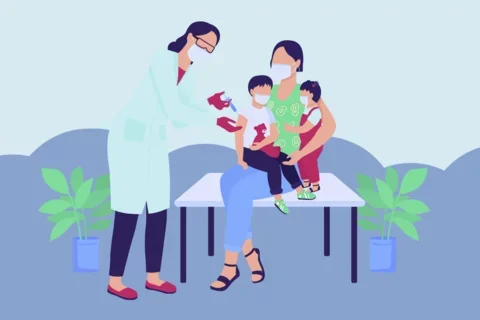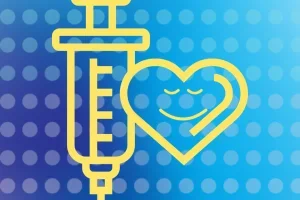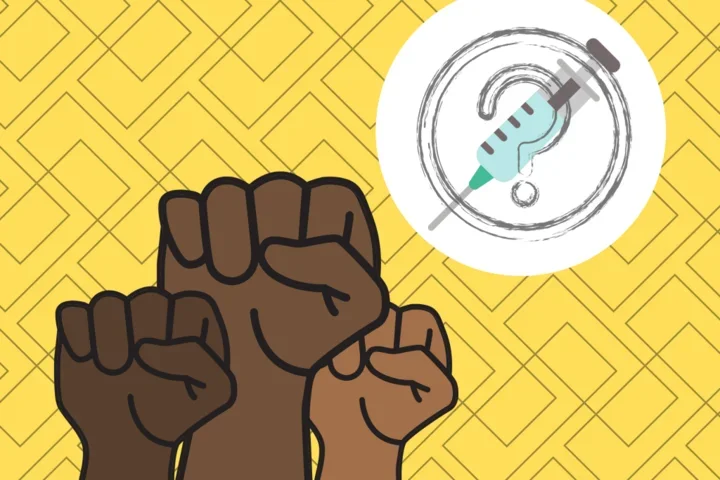Debunking the Myth: Vaccines Do Not Cause Autism By Tammy Shen

Debunking the Myth: Vaccines Do Not Cause Autism
By Tammy Shen
With the emergence and uptake of COVID-19 vaccines, there have been inevitable questions from the general public. Patients wonder: How do vaccines work? What’s inside them? The answers to such questions are critical for patients to understand, yet have also led to the spread of misinformation.
Myths about vaccine side effects first emerged in 1998, when a study purportedly found a relationship between the measles, mumps, and rubella (MMR) vaccine and autism was published. The study has since been retracted, the researcher who wrote it lost his medical license, and numerous studies since then have found no link between vaccines and the MMR vaccine. However, this study impacted public health confidence for decades as many people believed the falsified conclusion that vaccines cause autism, causing increasing vaccine hesitancy.
And now, with the prevalence of the COVID-19 vaccine, individuals are torn between adopting their previous beliefs and trusting scientific evidence. The COVID-19 vaccine is a mRNA vaccine, which means that it contains harmless material from the virus that tells cells to build a protein. Cells in the body are only able to recognize and fight a foreign virus if they have white blood cells with the same receptor proteins. Think of it like a jigsaw puzzle; the body will only be able to have an immune response to fight the virus if the puzzle piece fits. The protein that the COVID-19 vaccine makes is specific to the virus, and thus trains the body to make antibodies early. In the case that the individual does contract the virus, their body will have the tools needed to fight it.
While 2 doses of the MMR vaccine is enough to last an individual their lifetime, it is unknown as to how many doses of the COVID-19 vaccine will be recommended. This is largely due to the nature of the diseases that the MMR vaccine prevents: the viruses are unable to mutate as much as COVID-19 and still be able to function as a disease. COVID-19’s high possibility of mutation means that it is imperative that most individuals be vaccinated to develop herd immunity. When the majority of individuals are vaccinated and boosted, the virus is unable to spread as easily and decreases the chances of the virus mutating into a new strain.
Because of the long-standing history around vaccine myths in neurodivergent communities, questions about COVID-19 vaccine efficacy and safety for this population continue to circulate. This is extremely dangerous, as high-spread diseases such as measles require a 95% vaccination rate to limit the spread. Past anti-vaccination sentiment has spread to the COVID-19 vaccine and there have been numerous false claims that the vaccine causes and worsens autism. The majority of “anti-vaxxers,” or individuals that support the anti-vaccination movement, believe that the COVID-19 vaccine leads to extreme side effects, including the development of autism. Anti-vaccine conspiracies can be traced back as far as in the 1700s when the smallpox vaccine was developed. But with how easily available misinformation is on the internet, rumors spread much faster than before.
Such misinformation has not only affected vaccination rates of neurotypical individuals, but has also greatly impacted the disability community. The neurodivergent and disability community has long been stigmatized and characterized by words such as “incapable” or “different.” This negative connotation and opinion of neurodivergent individuals has only been further exacerbated by the COVID-19 vaccine conspiracies. Being able to access and go through with the vaccination process is already a struggle for many neurodivergent individuals, and the false information surrounding the vaccine only magnifies the anxieties of such individuals and their loved ones. Those with autism often have sensory issues and/or needle phobias that can make vaccination a triggering and traumatic experience, even when the individual wants the vaccine.
It is imperative that individuals in the neurodivergent community be vaccinated; individuals with developmental disabilities such as autism are 2.71 times more likely to die after contracting COVID-19. Such individuals are at a higher risk as they often live in a group setting, have trouble recognizing and communicating symptoms, and have trouble understanding or following safety precautions. Vaccines boost immunity, which decreases the severity of COVID-19 symptoms and death rate. Yet, a study published by the Journal of Pediatric Nursing reported that only 35% of parents of children with autism intended to vaccinate their child against COVID-19. The study found that misinformation and beliefs in vaccine harm disempower parents to seek out vaccines, even though most parents trust pediatric healthcare providers to make decisions on their child’s health.
The misconception that vaccines cause autism is a myth that has been confirmed in number studies over several decades. The efficacy of the COVID-19 vaccine has been supported in numerous studies. There have been no complicating interactions found between autism and COVID-19 vaccines, and the likelihood of the vaccine interacting with medications is extremely small. Vaccines are a safe and effective way to boost immunity against harmful viruses, including COVID-19.


